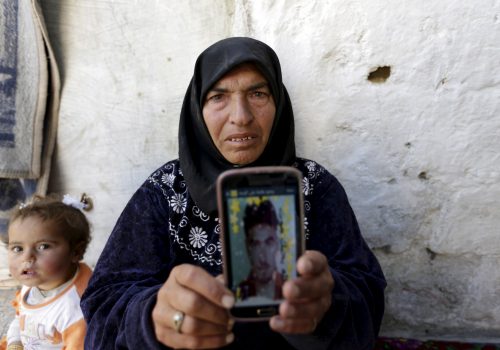Assad is appointing new military officials to escape sanctions on Syria
As a response to the Syrian uprising in 2011 and the bloody events that followed, the United States, United Kingdom, and several European countries blacklisted many Syrian regime officials who had been involved in mass human rights violations in Syria. These countries barred these individuals from crossing into their borders and froze their bank accounts.
However, such sanctions did not stop human rights violations against the Syrian people nor did they push the Bashar al-Assad regime to commit seriously to a political solution. In fact, sanctions failed to bring anyone responsible for war crimes to justice. Even worse, the lack of sanctions enforcement and the overall ineffectiveness of the approach encouraged a number of Arab countries to normalize relations with the Assad regime and rejoin it in the Arab League on May 19.
As the conflict enters its twelfth year, the Assad regime wishes to escape its crimes by counting on the statute of limitations and the introduction of new military and security figures that pledge absolute loyalty. The Assad regime is also cynically leveraging the February 6 earthquake, which killed more than 56,000 people, claiming that sanctions obstruct the delivery of humanitarian aid to those affected.
Changing the guard to evade sanctions
At the beginning and middle of each year, Assad issues a bulletin detailing new appointments and promotions in his army. This involves pensioning off officers who reach retirement age and appointing others in their place. Some officers are also moved up the ranks.
At the beginning of 2023, a confidential and unpublished bulletin of appointments and promotions for the Syrian army was issued, which I obtained from various sources and cross-referenced with public information. Of the thirty Syrian army and security officers in leadership positions, only two—General Suheil al-Hassan and General Saleh Al Abdullah—are blacklisted by Western countries. This indicates a significant gap in the sanctions system, revealing that it does not keep pace with the shifting reality of regime personnel.
There are further examples of this. For instance, at the end of April 2022, Assad made General Ali Abdul Karim Ibrahim the chief of the general staff—a position that had been vacant since the beginning of 2018—and appointed General Ali Mahmoud Abbas as defense minister. Neither of them have been included in any Western sanctions lists.
Even when Western countries do issue sanctions against individuals, they often arrive years after the fact. Notably, the United States waited until October 2022 to blacklist three officers involved in the chemical attack on Eastern Ghouta in August 2013, which killed about 1,400 people. Ironically, those three officers had retired several years ago. Additionally, it took about a decade—March of this year—for Warrant Officer Amjad Yousef, who committed the Tadamon Massacre in April 2013, to be added to the sanctions list.
These delayed responses indicate a lack of motivation on the part of the United States and its Western partners to sanction regime officers with the same pace and enthusiasm as before.
Why sanctions take so long
Theoretically, it takes the US no more than twenty-four hours to place any person on its sanctions list, according to Matthew Tuchband, a former senior US government sanctions attorney, who believes the system is fast. However, he acknowledged to me that certain factors need to be met before such action can be taken.
First, there must be the political will to issue the sanction. Second, the relevant authorities must collect incriminating evidence on the actions that the individual or entity has committed, including matching witness accounts, videotapes, letters, dissidents, and evidence collected by non-governmental organizations and intelligence services. This also includes collecting the necessary biographical data—using public information, university records, and travel data—to ensure that the right person is targeted and cannot win any judicial appeal against the sanctions. Finally, the US Department of Treasury’s Office of Foreign Assets Control (OFAC) must coordinate with other US agencies—the same applies in the case of European sanctions—to take the necessary legal measures.
The process of obtaining personal and public information, in addition to incriminating evidence, is challenging and risky, especially for those in regime-controlled areas who are contacted by non-governmental organizations, civil society organizations, or activists interested in obtaining sensitive information regarding the regime’s military and security structure.
Sanctions strategies need to evolve
When the sanctions do come into place, they have proved to be of little help to the Syrian people. The United States likes to close off their borders to those they target while freezing their bank accounts, but most of these individuals do not have bank accounts at home or abroad and few would even think of traveling to nearby Lebanon, let alone the US.
Furthermore, it is known that regime officers receive money in dollars and gold—not in Syrian pounds, which has lost its worth—by extorting detainees and their families, which is usually done through cancerous networks that are linked to many officers, especially in the security services and military judiciary.
The current sanctions policy—like the Caesar Act and the Captagon Law—is not responsive to the reality on the ground, including the personnel changes that Assad is making. Western countries, led by the United States, should develop a new mechanism to impose sanctions on Syrian institutions committing human rights abuses, which would make it easier to target individuals at a later stage.
Adopting a more effective sanctions policy requires investing in the Syrian bureaucratic workforce and expanding communication and knowledge sharing with Syrian civil society organizations and violation documentation centers.
However, regardless of how effective and refined sanctions become, they alone will not alter the behavior of the regime’s leaders—most of whom boast sanctions as medals of victory. At present, sanctions have not prevented the Assad regime from bombing schools and hospitals, nor have they led to a political solution. Meanwhile, the Assad regime continues to pose a threat not only to the Syrian people but also to the region as a whole. Changing the Assad regime’s behavior is complicated and arduous, but it requires a comprehensive policy strategy that utilizes sanctions in a nuanced manner, and as one of many tools.
Muhsen AlMustafa is a research assistant at Omran Center for Strategic Studies and a nonresident fellow at the Tahrir Institute for Middle East Policy (TIMEP). Follow him on Twitter: @MuhsenAlmustafa.
Further reading
Tue, Oct 6, 2020
I survived Assad’s torture—here’s why I’m a proud advocate of the Caesar Act
MENASource By
The Caesar Act is not the solution, but an important tool that the US and the international community must use alongside others to end the killing in my homeland.
Fri, Jan 13, 2023
US sanctions on Syria aren’t working. It’s time for a new sanctions approach that minimizes humanitarian suffering and increases leverage.
MENASource By
Before making concessions, the United States can increase its leverage in Syria by dedicating resources to make use of the smart sanctions that US policymakers have already developed.
Wed, Sep 2, 2020
Caesar Act: The Syrian people are sapped while Assad grows stronger
MENASource By
The Bashar al-Assad regime is unconcerned about Syrian lives and, thus, worsening economic misery is unlikely to shift its calculations.
Image: Syrian President Bashar al-Assad (C) talks to soldiers during a visit to Jobar, northeast of Damascus, in this handout photograph distributed by Syria's national news agency SANA on January 1, 2015. Al-Assad visited a district on the outskirts of Damascus and thanked soldiers fighting "in the face of terrorism", his office said on its Twitter account on Wednesday, posting pictures of the rare trip. The account said the visit took place in Jobar, northeast of Damascus, on the occasion of the New Year. The district came under heavy Syrian air force strikes on Wednesday according to the Britain-based Syrian Observatory for Human Rights, which monitors the nearly four-year conflict. REUTERS/SANA/Handout


